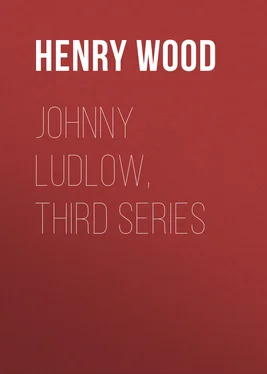Henry Wood - Johnny Ludlow, Third Series
Здесь есть возможность читать онлайн «Henry Wood - Johnny Ludlow, Third Series» — ознакомительный отрывок электронной книги совершенно бесплатно, а после прочтения отрывка купить полную версию. В некоторых случаях можно слушать аудио, скачать через торрент в формате fb2 и присутствует краткое содержание. Жанр: foreign_prose, literature_19, foreign_antique, на английском языке. Описание произведения, (предисловие) а так же отзывы посетителей доступны на портале библиотеки ЛибКат.
- Название:Johnny Ludlow, Third Series
- Автор:
- Жанр:
- Год:неизвестен
- ISBN:нет данных
- Рейтинг книги:4 / 5. Голосов: 1
-
Избранное:Добавить в избранное
- Отзывы:
-
Ваша оценка:
- 80
- 1
- 2
- 3
- 4
- 5
Johnny Ludlow, Third Series: краткое содержание, описание и аннотация
Предлагаем к чтению аннотацию, описание, краткое содержание или предисловие (зависит от того, что написал сам автор книги «Johnny Ludlow, Third Series»). Если вы не нашли необходимую информацию о книге — напишите в комментариях, мы постараемся отыскать её.
Johnny Ludlow, Third Series — читать онлайн ознакомительный отрывок
Ниже представлен текст книги, разбитый по страницам. Система сохранения места последней прочитанной страницы, позволяет с удобством читать онлайн бесплатно книгу «Johnny Ludlow, Third Series», без необходимости каждый раз заново искать на чём Вы остановились. Поставьте закладку, и сможете в любой момент перейти на страницу, на которой закончили чтение.
Интервал:
Закладка:
“That fellow was stealing a sly kiss in the dark, Johnny.”
“Like his impudence.”
“Rubbish,” retorted Tod. “It’s Christmas-tide, and all fair. Didn’t you see the bit of mistletoe he was holding up?” And Tod ran on, whistling a line of a song that the Squire used to sing in his young days:
“We all love a pretty girl, under the rose.”
Mr. Marcus Allen left the Copse Farm with hearty thanks for its hospitality. He promised to come again in the summer, when the fields should be sweet with hay and the golden corn was ripening.
No sooner had he gone than John Drench asked Jessy to promise to be his wife. Whether he had felt any secret jealousy of Mr. Marcus Allen and his attractions, and deemed it well to secure Jessy as soon as the coast was clear, he spoke out. Jessy did not receive the honour kindly. She tossed her pretty head in a violent rage: the idea, she said, of her marrying him . Jessy had never flirted with John Drench since the Aberystwith journey, or encouraged him in any way—that was certain. Unpleasantness ensued at the farm. Mr. Page decidedly approved of the suitor: he alone had perceived nothing of Susan’s hopes: and, perhaps for the first time in his life, he spoke sharply to Jessy. John Drench was not to be despised, he told her; his father was a wealthy man, and John would have a substantial portion; more than double enough to put him into the largest and best farm in the county: Mr. Drench was only waiting for a good one to fall in, to take it for him. No: Jessy would not listen. And as the days went on and John Drench, as she said , strove to further his suit on every opportunity, she conceived, or professed, a downright aversion to him. Sadly miserable indeed she seemed, crying often; and saying she would rather go out as lady’s-maid to some well-born lady than stay at home to be persecuted. Miss Susan was in as high a state of rapture as the iniquity of false John Drench permitted; and said it served the man right for making an oaf of himself.
“Let be,” cried old Page of Jessy. “She’ll come to her senses in time.” But Miss Abigail, regarding Jessy in silence with her critical eyes, took up the notion that the girl had some secret source of discomfort, with which John Drench had nothing to do.
It was close upon this, scarcely beyond the middle of January, when one Monday evening Duffham trudged over from Church Dykely for a game at chess with the Squire. Hard weather had set in; ice and snow lay on the ground. Mrs. Todhetley nursed her face by the fire, for she had toothache as usual; Tod watched the chess; I was reading. In the midst of a silence, the door opened, and old Thomas ushered in John Drench, a huge red comforter round his neck, his hat in his hand.
“Good-evening, Squire; good-evening, ma’am,” said he in his shy way, nodding separately to the rest of us, as he unwound the comforter. “I’ve come for Miss Jessy, please.”
“Come for Miss Jessy!” was the Squire’s surprised echo. “Miss Jessy’s not here. Take a seat, Mr. John.”
“Not here?” cried Drench, opening his eyes in something like fear, and disregarding the invitation to sit down. “Not here! Why where can she have got to? Surely she has not fallen down in the snow and ice, and disabled herself?”
“Why did you think she was here?”
“I don’t know,” he replied, after a pause, during which he seemed to be lost. “Miss Jessy was not at home at tea: later, when I was leaving for the night, Miss Abigail asked me if I would come over here first and fetch Jessy. I asked no questions, but came off at once.”
“She has not been here,” said Mrs. Todhetley. “I have not seen Jessy Page since yesterday afternoon, when I spoke to her coming out of church.”
John Drench looked mystified. That there must have been some misapprehension on Miss Page’s part; or else on his, and he had come to the wrong house; or that poor Jessy had come to grief in the snow on her way to us, seemed certain. He drank a glass of ale, and went away.
They were over again at breakfast time in the morning, John Drench and Miss Abigail herself, bringing strange news. The latter’s face turned white as she told it. Jessy Page had not been found. John Drench and two of the men had been out all night in the fields and lanes, searching for her. Miss Abigail gave us her reasons for thinking Jessy had come to Dyke Manor.
On the Sunday afternoon, when the Miss Pages went home from church, Jessy, instead of turning indoors with them, continued her way onwards to the cottage of a poor old woman named Matt, saying Mrs. Todhetley had told her the old granny was very ill. At six o’clock, when they had tea—tea was always late on Sunday evenings, as Sally had leave to stay out gossiping for a good hour after service—it was discovered that Jessy had not come in. Charley was sent out after her, and met her at the gate. She had a scolding from her sister for staying out after dark had fallen; but all she said in excuse was, that the old granny was so very ill. That passed. On the Monday, soon after dinner, she came downstairs with her things on, saying she was going over to Dyke Manor, having promised Mrs. Todhetley to let her know the real state of Granny Matt. “Don’t thee get slipping in the snow, Jessy,” said Mr. Page to her, half jokingly. “No danger, father,” she replied: and went up and kissed him. As she did not return by tea-time, Miss Page took it for granted she was spending the evening with us. Since that, she had not been seen.
It seemed very odd. Mrs. Todhetley said that in talking with Jessy in the porch, she had incidentally mentioned the sickness of Granny Matt. Jessy immediately said she would go there and see her; and if she found her very ill would send word to Dyke Manor. Talk as they would, there was no more to be made of it than that: Jessy had left home to come to us, and was lost by the way.
Lost to her friends, at any rate, if not to herself. John Drench and Miss Page departed; and all day long the search after Jessy and the speculation as to what had become of her continued. At first, no one had glanced at anything except some untoward accident as the sole cause, but gradually opinions veered round to a different fear. They began to think she might have run away!
Run away to escape Mr. John Drench’s persevering attentions; and to seek the post of lady’s-maid—which she had been expressing a wish for. John stated, however, that he had not persecuted her; that he had resolved to let a little time go by in silence, and then try his luck again. Granny Matt was questioned, and declared most positively that the young lady had not stayed ten minutes with her; that it was only “duskish” when she went away. “Duskish” at that season, in the broad open country, with the white snow on the ground, would mean about five o’clock. What had Jessy done with herself during the other hour—for it was past six when she reached home,—and why should she have excused her tardiness by implying that Granny Matt’s illness had kept her?
No one could fathom it. No one ever knew. Before that first day of trouble was over, John Drench suggested worse. Deeply mortified at its being said that she might have run away from him, he breathed a hasty retort—that it was more likely she had been run away with by Mr. Marcus Allen. Had William Page been strong enough he had certainly knocked him down for the aspersion. Susan heard it with a scared face: practical Miss Abigail sternly demanded upon what grounds he spoke. Upon no grounds in particular, Drench honestly answered: it was a thought that came into his mind and he spoke it on the spur of the moment. Any way, it was most unjust to say he had sent her.
The post-mistress at the general shop, Mrs. Smail, came forward with some testimony. Miss Jessy had been no less than twice to the shop during the past fortnight, nay, three times, she thought, to inquire after letters addressed J. P. The last time she received one. Had she been negotiating privately for the lady’s-maid’s situation, wondered Abigail: had she been corresponding with Mr. Marcus Allen, retorted Susan, in her ill-nature; for she did not just now hold Jessy in any favour. Mrs. Smail was asked whether she had observed, amongst the letters dropped into the box, any directed to Mr. Marcus Allen. But this had to be left an open question: there might have been plenty directed to him, or there might not have been a single one, was the unsatisfactory answer: she had “no ‘call’ to examine the directions, and as often did up the bag without her spectacles as with ’em.”
Читать дальшеИнтервал:
Закладка:
Похожие книги на «Johnny Ludlow, Third Series»
Представляем Вашему вниманию похожие книги на «Johnny Ludlow, Third Series» списком для выбора. Мы отобрали схожую по названию и смыслу литературу в надежде предоставить читателям больше вариантов отыскать новые, интересные, ещё непрочитанные произведения.
Обсуждение, отзывы о книге «Johnny Ludlow, Third Series» и просто собственные мнения читателей. Оставьте ваши комментарии, напишите, что Вы думаете о произведении, его смысле или главных героях. Укажите что конкретно понравилось, а что нет, и почему Вы так считаете.












